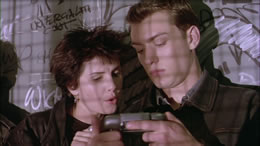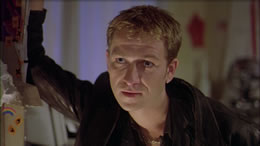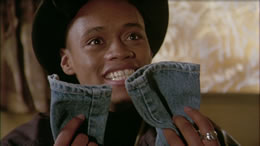
Color, 1994, 106m.
Directed by Paul W.S. Anderson
Starring Jude Law, Sadie Frost, Sean Pertwee, Fraser James, Sean Bean, Marianne Faithfull, Jonathan Pryce
Severin (Blu-Ray/DVD) (US R0 HD/NTSC) / WS (1.85:1) (16:9), DD5.0, Universal (UK R2 PAL) / DD2.0
 The indie film explosion of the 1990s saw a huge resurgence in "angry young man" variation of British filmmaking, though instead of the gritty kitchen-sink realism of the '60s, this time viewers got an eyefull of flashy visual style, aggressive soundtracks, stampeding amoral behavior, and plenty of vicarious thrills. The reigning champ of this trend is easily Danny Boyle's Trainspotting from 1996, but two years earlier, Shopping mined somewhat similar territory and introduced some fresh faces in front of and behind the camera who would go on to very different careers.
The indie film explosion of the 1990s saw a huge resurgence in "angry young man" variation of British filmmaking, though instead of the gritty kitchen-sink realism of the '60s, this time viewers got an eyefull of flashy visual style, aggressive soundtracks, stampeding amoral behavior, and plenty of vicarious thrills. The reigning champ of this trend is easily Danny Boyle's Trainspotting from 1996, but two years earlier, Shopping mined somewhat similar territory and introduced some fresh faces in front of and behind the camera who would go on to very different careers.
In some unspecificed near future in England, youths have gone out of control and amuse themselves at night by indulging in plenty of destructive behavior. Recently released from prison, Billy (Law, in his film debut) hooks up with his jaded Irish girlfriend, Jo (Frost), for a string of smash-and-grab jobs that involve ramming a stolen car through a store window and swiping anything in sight just for kicks. Called "ram-raiding," this practice has the police hot on their tail and another gang trying to chase them down as well; Billy's closest rival, Tommy (Pertwee), also has a penchant for taunting the police, and it's amazing the entire law enforcement unit doesn't just park out at night and tear gas all of them. Anyway, Jo starts pushing Billy for something bigger and better, which of course means one last job involving the wholesale smash-up of the city's main shopping center.
 After a few negligible TV roles, the baby-faced Law emerged a full-fledged movie star with this film and went on to become a hot name abroad thanks to his excellent supporting role in Gattaca (1997) which managed to steal the entire film. His career has swerved all over the road ever since as he's never quite become a matinee idol, but films like eXistenZ, The Talented Mr. Ripley, and Closer ensured that he stayed busy as a character actor. He actually met Frost on this film and married her shortly after, though they split under extremely unpleasant circumstances and fought in court over child custody for years. At the time of this film, Frost was the much hotter name thanks to her sultry turn in Bram Stoker's Dracula, but for some reason (perhaps her chamleonic change in appearance with each project) she's never had a really juicy role ever since. The supporting cast includes a slew of great British talent including Sean Bean (right in between Patriot Games and Goldeneye), husky-voiced pop legend Marianne Faithfull, Jonathan Pryce (mostly seen on TV as a bureaucrat, of course), and a very young Jason Isaacs way before TV's Brotherhood and the Harry Potter movies.
After a few negligible TV roles, the baby-faced Law emerged a full-fledged movie star with this film and went on to become a hot name abroad thanks to his excellent supporting role in Gattaca (1997) which managed to steal the entire film. His career has swerved all over the road ever since as he's never quite become a matinee idol, but films like eXistenZ, The Talented Mr. Ripley, and Closer ensured that he stayed busy as a character actor. He actually met Frost on this film and married her shortly after, though they split under extremely unpleasant circumstances and fought in court over child custody for years. At the time of this film, Frost was the much hotter name thanks to her sultry turn in Bram Stoker's Dracula, but for some reason (perhaps her chamleonic change in appearance with each project) she's never had a really juicy role ever since. The supporting cast includes a slew of great British talent including Sean Bean (right in between Patriot Games and Goldeneye), husky-voiced pop legend Marianne Faithfull, Jonathan Pryce (mostly seen on TV as a bureaucrat, of course), and a very young Jason Isaacs way before TV's Brotherhood and the Harry Potter movies.
 However, the most surprising name attached to Shopping is its first-time director, Paul W.S. Anderson, who got enough notoriety off of this film (which censors feared would cause copycat crimes) to make the jump to big studo filmmaking. His Mortal Kombat is basically a big caffeine headache of a film, but he earned a modest cult following with the flashy but incoherent Event Horizon, the okay Soldier, and his strongest film to date, the far superior first entry in the Resident Evil series. (For the record, his subequent films include Death Race, the lousy Alien vs. Predator, Resident Evil: Afterlife, and The Three Musketeers). With Shopping, his borrowings from Luc Besson and Terry Gilliam get a bit too obvious to ignore (especially Subway, which deserves a place somewhere in the end credits), but he pulls off some arresting sequences and kinetic chase scenes, especially a beautiful moment involving the looting of a shop after the sprinklers have all been triggered. It certainly deserved better than its straight-to-video fate in America by New Horizons, who lopped a minute off the running time as well for no good reason. At its best, it's a breakneck, stylish, and engaging entry in the last great wave of British cinema to date.
However, the most surprising name attached to Shopping is its first-time director, Paul W.S. Anderson, who got enough notoriety off of this film (which censors feared would cause copycat crimes) to make the jump to big studo filmmaking. His Mortal Kombat is basically a big caffeine headache of a film, but he earned a modest cult following with the flashy but incoherent Event Horizon, the okay Soldier, and his strongest film to date, the far superior first entry in the Resident Evil series. (For the record, his subequent films include Death Race, the lousy Alien vs. Predator, Resident Evil: Afterlife, and The Three Musketeers). With Shopping, his borrowings from Luc Besson and Terry Gilliam get a bit too obvious to ignore (especially Subway, which deserves a place somewhere in the end credits), but he pulls off some arresting sequences and kinetic chase scenes, especially a beautiful moment involving the looting of a shop after the sprinklers have all been triggered. It certainly deserved better than its straight-to-video fate in America by New Horizons, who lopped a minute off the running time as well for no good reason. At its best, it's a breakneck, stylish, and engaging entry in the last great wave of British cinema to date.
Severin's release of Shopping is the first really respectful treatment it's received stateside, and the anamorphic presentation is going to be a welcome revelation after years of lousy one-inch tape transfers. The Blu-Ray version is particular is very clear and colorful; the '90s film stock means some of the darker scenes still have that grimy, gritty edge, of course, which is as it should be. Audio options are presented in Dolby Digital 5.0 and 2.0; expect lots of smashing and crashing in your rear speakers, though otherwise it's fairly limited given the nature of the source material. Extras include the original EPK consisting of B-roll footage from the set and interviews with the two leads and director (carried over from the earlier UK Universal disc, which looked far inferior), and a new featurette ("Shallow Grave: The Burying of Shopping") and audio commentary with Anderson and producer Jeremy Bolt, who spend much time talking about the difficult and controversial release of the film in its native country, the complex story behind its journey to America, the relationship between Law and Frost, and working with a notable roster of acting pros on a first film. For perhaps the only time ever, Anderson does not promise an elusive director's cut for the film in question.


 The indie film explosion of the 1990s saw a huge resurgence in "angry young man" variation of British filmmaking, though instead of the gritty kitchen-sink realism of the '60s, this time viewers got an eyefull of flashy visual style, aggressive soundtracks, stampeding amoral behavior, and plenty of vicarious thrills. The reigning champ of this trend is easily Danny Boyle's Trainspotting from 1996, but two years earlier, Shopping mined somewhat similar territory and introduced some fresh faces in front of and behind the camera who would go on to very different careers.
The indie film explosion of the 1990s saw a huge resurgence in "angry young man" variation of British filmmaking, though instead of the gritty kitchen-sink realism of the '60s, this time viewers got an eyefull of flashy visual style, aggressive soundtracks, stampeding amoral behavior, and plenty of vicarious thrills. The reigning champ of this trend is easily Danny Boyle's Trainspotting from 1996, but two years earlier, Shopping mined somewhat similar territory and introduced some fresh faces in front of and behind the camera who would go on to very different careers.

